The Brown and White asked previous and current editors in chief and managing editors “What does journalism and the Brown and White mean to you?” in honor of the 125th anniversary of The Brown and White on Jan. 16, 2019. More stories reflecting on 125 years of the publication to come.

Abby Smith, ’15, was the fall 2014 editor in chief. (courtesy of Abby Smith)
Abby Smith ’15
Editor in chief fall 2014
“Journalism is not just my profession and my passion, but a power.
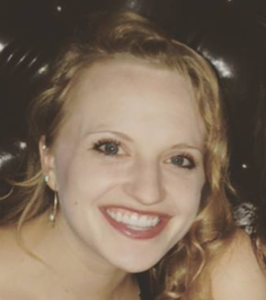
Becca Bednarz, ’15, was a managing editor in fall 2014. (courtesy of Becca Bednarz)
Becca Bednarz ’15
Managing editor fall 2014
“Journalism is not the art of writing stories people necessarily want to hear. As both a journalist and someone who perpetually craves harmony, that was always a bitter pill for me to swallow. It’s a difficult field; regardless of what you write, when or where or how you write it, whom you quote, or which style guide you use, you’re bound for some level of criticism. But anything truly worth saying, whether in journalism or otherwise, will have its critics. Without The Brown and White, I would have never found the courage to publicly tackle issues that genuinely matter — let alone use my own voice in raising them.
“Beyond that, the dedication of our staff remains unmatched by any other organization I’ve ever been a part of. My fellow writers and editors are still some of the strongest, smartest, most deeply passionate humans I know. These are people who trudged through hurricanes with cameras in hand, skipped sleep for days on end and routinely sacrificed their own wishes in the interest of contributing to something bigger than themselves. I’m a better writer and better journalist, sure, but also an infinitely better, bolder person, for having been among their ranks.”

Danielle DiStefano, ’16, was the fall 2015 editor in chief.
Danielle DiStefano ’16
Editor in chief fall 2015
Kelsey Alpaio ’15
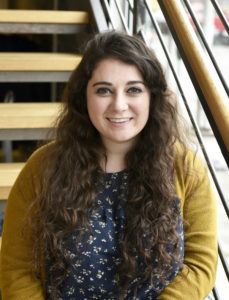
Kelsey Alpaio, ’15, was the editor in chief for the spring 2015 semester.
Editor in chief spring 2015
“In one of my last issues as editor in chief of the Brown and White, my peers and I published an article about sexual assault on campus. We had to make some incredibly difficult decisions regarding printing source names, profane language and painful personal accounts. Together, we had to work through the fear of printing a story that a lot of people didn’t want to read on a topic they didn’t want to confront. A story that would go on to impact our interactions in classrooms, coffee shops and dorm rooms. A story that still exemplifies what journalism, and the Brown and White, means to me.
“Journalism is about finding the truth and telling its story — both the stories that want to be told, and those that don’t. The Brown and White, and the amazing professors, editors and friends I worked with during my time at Lehigh, taught me how to tell those stories. I have them to thank for my passion, my career and my coffee addiction.”
Kerry Mallett ’15
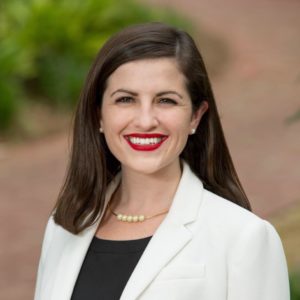
Kerry Mallett, ’15, was the managing editor for the spring 2015 semester.
Managing editor spring 2015
“While I am not in the field of journalism, I haven’t left higher education since graduating from Lehigh, and working in student affairs makes me see the importance of journalism daily. From students who had misinformation about Charlottesville to student activism being fueled by student journalists uncovering wrongdoing on campus, the importance of a free, accurate press in both our nation and college campuses is something that I am reminded of constantly. In order to have properly informed citizens who are able to hold people in power accountable, we need a fair and honest press, and to teach our citizens how to critically look at news and not dismiss what they don’t agree with as ‘fake news.’
“The Brown and White fueled and cemented all of these convictions in me. From being able to cover breaking news and seeing the human impact of good — and sometimes not where it needed to be – reporting, to developing a personal and collective voice on the editorial pages about campus issues, I am a better person, professional, and citizen from my years spent on the third floor of Coppee, and I am indebted to the B&W for that. From moments as small as debating layout or the best way to phrase a headline to putting a story to print with derogatory language a student group used, I was able to be part of a team that strove each day to tell the Lehigh story and news, and tell it well and accurately.”

Jacquline Tenreiro, ’16, was the editor in chief in the spring 2016 semester. (courtesy of Jacquline Tenreiro)
Jacqueline Tenreiro ’16
Editor in chief spring 2016
“For me, journalism has always been about telling stories.
“They could be stories that hold powerful people and institutions to account, or ones that celebrate the best parts of the human experience. They could impact a community of millions or, say, a student population of around 5,000.
“They could be difficult, near-impossible ones to tell. But those are the most important ones.
“Journalism offers the truth and perspective in trying times. It offers a voice to those who were previously unheard. So long as a story affects someone, it matters.
“And no matter the scale — a refugee crisis, healthcare legislation or the relationship between an administration and its student body — a story deserves to be told. People deserve to hear it.
“The Brown and White is where I learned all the important parts of a story — and it’s where I found the courage to go out and tell them myself.”

Samantha Tomaszewski, ’17, was the fall 2016 editor in chief. (courtesy of Samantha Tomaszewski)
Samantha Tomaszewski ’17
Editor in chief fall 2016
“Journalism is important to me because it’s a check on those in power. Whether at The Brown and White or at national outlets, journalists work hard to hold important individuals accountable for their actions. Especially in today’s politics, where so much is being dismissed as ‘fake news,’ the role of journalism as a watchdog on institutions is more important than ever.
Gaby Morera ’17
Editor in chief spring 2017

Gaby Morera, ’17, was the editor in chief in the spring 2017 semester. (Roshan Giyanani ’19/ BW Staff)
“Journalism is storytelling in many forms: from covering the local city hall meetings to features on people who do things that were thought as impossible. In its essence journalism is just true stories. As a student editor for The Brown and White, I learned the impact these true stories can have. They can make people feel seen, or inspire them to do something brave. They can also make them angry or expose them to a point of view they’ve never heard before. But, more selfishly, journalism was a way for me to learn about so many different things — from random sports terminology to learning about how a liver transplant is conducted. Through journalism we all get to learn a little bit of everything.”
Madison Gouveia ’17
Managing editor spring 2017

Madison Gouveia, ’17, was a managing editor in spring 2017. (courtesy of Madison Gouveia)
“Growing up I always loved to write, but the way you’re often encouraged to write when you’re young is through creative fiction. Create your own fairytale. Choose your own adventure. Whenever I sat down to write a story, I couldn’t bring myself to invent one. I could tell stories, but I couldn’t make them up. I couldn’t draw details out of thin air. I couldn’t find my voice.
“During my time at Lehigh, in the journalism department, and the late, late nights in Coppee Hall as both a reporter and an editor of The Brown and White, I was encouraged to explore a vastly different style of writing: the truth. From the Rauch Business Center, to Goodman Stadium, to the South Side community there was truth to seek, news to report, and an infinite number of stories to highlight. I fell in love with journalism almost immediately – why create fictional stories when around every corner there are beautiful, powerful, real stories to tell?
“I learned that maybe it wasn’t about finding my own voice, but finding voices to amplify so I could tell important stories that made a difference. Journalism is an opportunity to give voice to the voiceless, and to hold the most powerful voices – in a community, a nation, the world – to account. It’s an opportunity to bring to life the stories, from the most quintessential to the most outlandish, that shape our human experience. Journalism provides a written record of the truth – the victories we celebrate, the tragedies we survive, the hardships we learn through. It’s our history, it’s who we are, its where we’ve been and it’s where we’re going. If journalists don’t tell these stories, who will? I cannot think of an opportunity, an obligation, more important, and I will always be thankful for my time at The Brown and White and the stories I was able to tell as a result.”

Austin Vitelli, ’17, was a spring 2017 managing editor. (courtesy of Austin Vitelli)
Austin Vitelli ’17
Managing editor spring 2017
“Journalism will always hold a special place in my heart, even if I’m not actively participating in it at the moment. Working for The Brown and White taught me the importance of reporting information both swiftly and accurately and how this is especially important in the age of social media and the 24-hour news cycle. Interviewing people for articles taught me to become more comfortable with people and to better empathize with their stories. But most of all, I will never forget the relationships that I built with people in the newsroom and how much fun I had putting that paper together twice a week, no matter how late into the night it took.”

Emily Ward, ’18, was the fall 2017 editor in chief. (courtesy of Emily Ward)
Emily Ward ’18
Editor in chief fall 2017
“Journalism is important to me because it gave me an outlet to channel all the curiosity I have for the world. It’s important to me because it gave me thick skin, making me a more fearless and confident version of myself. Finally, journalism is important to me because I believe in the power of compelling, brave and truthful storytelling. I owe my deep love and respect for journalism to The Brown and White. It was one of the greatest learning experiences of my life and certainly my most rewarding experience at Lehigh.”

Rebecca Wilkin, ’18, was a managing editor in the fall 2017 semester. (courtesy of Rebecca Wilkin)
Rebecca Wilkin ’18
Managing Editor fall 2017
“Journalists, including student journalists, have the power and responsibility to serve as watchdogs, give voices to the voiceless and deliver transparency to society. Without student newspapers like The Brown and White, we run the risk of losing this transparency that’s crucial for both the university and surrounding communities. Student journalists have the capacity to invoke change by pursuing injustices and reporting on issues that matter, even when faced with opposition. It’s impossible to imagine my Lehigh experience without remembering the countless hours I spent reporting, writing and editing for The Brown and White. I’m forever grateful for the lessons I learned, the relationships I forged with my professors and peers, and the courage that this newspaper instilled in me to follow my passions. I hope that The Brown and White continues to inspire future generations of student journalists, just as it has done for 125 years.”
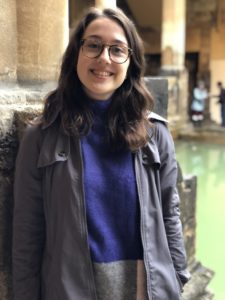
Klaudia Jazwinska, ’18, was the spring 2018 editor in chief. (courtesy of Klaudia Jazwinska)
Klaudia Jazwinska ’18
Editor in chief spring 2018
“Quality, ethical and accessible journalism is an indispensable public service. Journalists have a responsibility to write the first draft of history, hold the powerful and privileged accountable, and help amplify the voices of those who might not otherwise be heard. Student journalists tell the stories of their campus community and serve as a check on their academic institution. Working for ‘The Brown and White’ and witnessing the direct impact of our reporting on the student body helped me realize the value of community-centered journalism. Having these opportunities to ask meaningful questions and tell impactful stories inspired me to want to pursue a career in investigative journalism.”

Casey Farmer, ’18, was a managing editor in spring 2018.
Casey Farmer ’18
Managing editor spring 2018
“Journalism is important to me because it allows me to explore new communities to hear and share the voices of the people. My experience with The Brown and White gave me the opportunity to connect with Bethlehem residents in a way that I would not have otherwise. Without journalism, important stories, opinions and issues go unheard. “

Cate Peterson, ’18, was a spring 2018 managing editor. (courtesy of Cate Peterson)
Cate Peterson ’18
Managing editor spring 2018
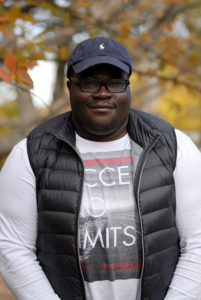
Zion Olojede, ’18, was a managing editor in the spring 2018 semester.
Zion Olojede ’18
Managing editor spring 2018
“A lot of people still believe journalism is strictly writing. Nowadays, it’s evolved beyond that. Journalism has allowed me to dive into different skillsets like video and graphics in addition to writing. The Brown and White was a platform I used to grow in all of those areas and now, I’m using all of my skillsets for a major media corporation every day. My advice for those aspiring to enter the media world is to try to be multifaceted in your skillset. Be different and separate yourself from the average person.”

Madison Hoff, ’19, is the editor in chief for the spring 2019 semester.
Madison Hoff ’19
Editor in chief spring 2019
“To me, journalism means telling the truth, keeping people accountable and providing the public with coverage on a variety of stories – especially news they might not have access to themselves. Anyone can practice journalism today, but journalism is still important and journalists hold a vital role to present news. Since I’ve been at Lehigh, it has been great to see the paper grow to actively try to cover more than just the university and always work on new ways to improve the publication such as integrating a new data and graphics department and setting up a beat system.
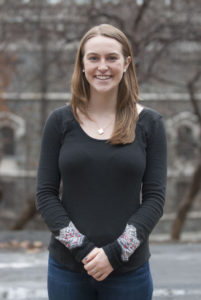
Alexis McGowan, ’19, is the managing editor of the spring 2019 semester.
Alexis McGowan ’19
Managing editor spring 2019
“Journalism is about seeking and telling the truth. It is the responsibility of journalists to accurately and neutrally tell stories and inform the public. In the midst of uncertainty, journalists are supposed to be trustworthy. They act as liaisons between the chaos and the public. Today, journalism is so much more than writing. Stories can be shared in a variety of ways including through videos, photos and social media. Almost anyone can be a journalist, as long as they tell the truth.
“Personally, I appreciate the storytelling aspect of journalism. As someone who likes to be ‘in the know,’ I enjoy being able to inform others. As a reporter and editor for the Brown and White, I feel responsible for telling students, faculty and the Lehigh community every story, no matter the size. I am so grateful for everything journalism and the Brown and White have taught me.”
Editor’s note: The post has been updated to include more responses.

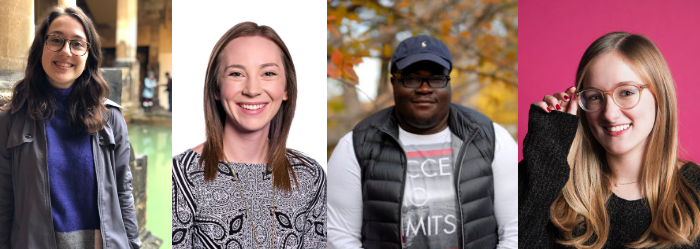

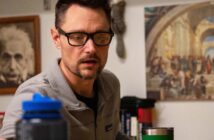
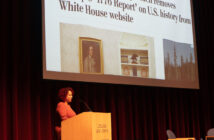

Comment policy
Comments posted to The Brown and White website are reviewed by a moderator before being approved. Incendiary speech or harassing language, including comments targeted at individuals, may be deemed unacceptable and not published. Spam and other soliciting will also be declined.
The Brown and White also reserves the right to not publish entirely anonymous comments.
4 Comments
As a reader, I congratulate all those who served as managing editors as well as all others who collaborated on putting out The Brown and White (B&W). The common thread seems to be dedication and reporting the truth with a secondary aspect of being a voice for those not having one. The dedication seems to be continuing as many seem to be active in the journalism field.
It seems as though fellow students and citizens, with their current reading habits, may not come close to the dedication of those in the article, Locally in Atlanta the daily printed paper is taking steps to improve it’s product while seeing declines in circulation as well as in employees.
Dedication to Journalism is unassailable but the truth is trickier. Factual coverage of a story may not be the truth, as I see it, and hopefully as B&W managing editors may see it. I want Journalism to lead me to an informed discussion, not only with those who agree with me but also those who disagree. I may be in the minority on this.
This viewpoint leads me to note that in “being a voice for those not having one”, should provide reporting on the voices of those who have a voice e.g. student vs board member.
Today’s Atlanta Journal Constitution (AJC) is an example of informed discussion with an article concerning the inclusion of a citizenship question on the upcoming census as well as an editorial “From the Left” and “From the Right. The article gives reported facts from both sides as well as facts concerning some of the basic reasons for the census (a typical recent addition to articles). “The Left” mentions Mr. Trump and the border wall as well as the continuing use of “identity politics” closing with the “real issue behind the standoff”. “The Right” asks if the US has a right to limit immigration and describes the Democrats backing of the anti-immigrant stance of Cesar Chavez but changing their view in anticipation of more legalized illegal immigrants becoming Democratic voters.
If there is a truth it should answer a question. It seems as though politicians never want to specify the question. The truth often is indeterminate because the question is not specified.
To all of you inspiring former B&W managing editors and others preceding you: craft the questions, be open minded in your reporting and inform the debate. I hope to see your bylines in the future.
Would like to see more diversity, particularly males identifying editors and editors of color – leadership seems to be very tilted to white womyn.
Does Lehigh have outreach to encourage asian and males for the Brown and White? These two groups seem very under represented compared to the student population. Maybe there is a be a guy’s column and a multi-ethnic column set aside? Lehigh you can and must do better!
I think this is a justification for my pet peeve concerning diversity. I don’t think it is necessary to REQUIRE diversity of people in charge in order to provide diversity of viewpoint and output. While the managing editors are largely female and white, the coverage in The Brown and White (B&W) is not largely female and white. I read articles in the B&W that are across the spectrum of issues. A certain amount of sensitivity to and respect for diversity IS required. The diversity of the B&W staff does exist and it is a measure of the quality of the managing editors that diversity is in the B&W articles.
B&W tends to be liberal; there could be an addition of conservative views other than administration policies. That might be too much to ask of university students.
I would have liked to see you reach out to the editors of my years, 1958-1962. In 1958 the Brown and White wrote an editorial or story blasting Lehigh for cooperating with Who’s Who saying it was just a money making machine. Our freshman dorm conspired to send a letter to the Brown and White from a fictional southern law firm suing or threatening to sue Lehigh and the Brown and White for defaming Who’s Who. My recollection is that the University took it seriously but eventually found out and took some action against the ringleaders. Curious if any of the editors at that time remember the incident.